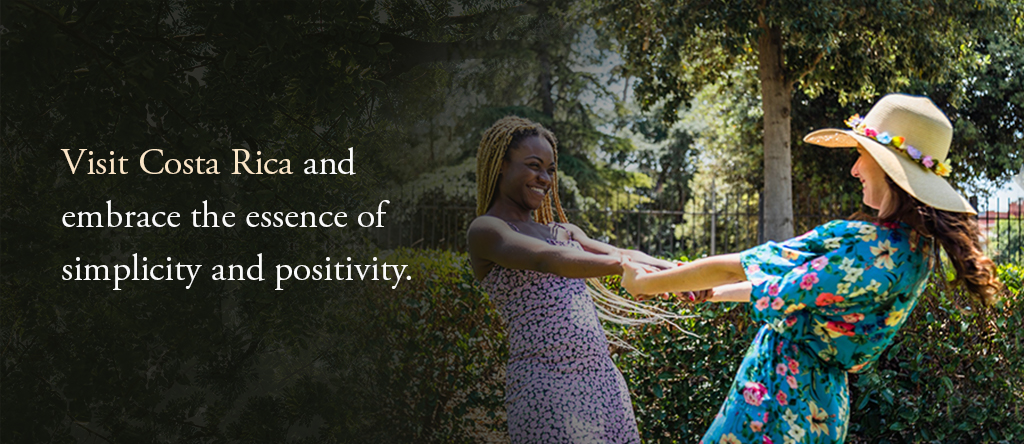Are you planning your vacation to Costa Rica and unsure whether to begin your conversation with a friendly ‘Hi!’ or a formal ‘Hello’? While it may seem trivial, familiarizing yourself with the customs and etiquette of a country before visiting is essential for a smooth and respectful experience. To truly immerse yourself in Costa Rican culture, it is crucial to grasp the customs and etiquette of the country. This knowledge not only helps you integrate smoothly but also allows you to adapt to your new surroundings. Embrace the rhythm of daily life, forge meaningful connections, exercise patience, and approach each unique experience as a chance to learn and grow. Remember to embrace the unexpected with a lighthearted attitude, and don’t hesitate to laugh off cultural blunders. In Costa Rica, laughter is truly the finest remedy for any situation.
In the culturally rich tapestry of Costa Rica, the country’s languages and ethnic backgrounds contribute to its vibrant and multicultural society. Immerse yourself in Costa Rica’s rich culture and traditions by understanding and embracing its customs and etiquette before you visit or move to Costa Rica. From warm greetings to thoughtful gift-giving and dining manners to tipping practices, here are some essential guidelines to help you navigate social interactions with grace and respect in Costa Rica.

Facts and Statistics about Costa Rica
Let’s learn some stats and facts about Costa Rica before moving toward customs and etiquette.
- Location: Costa Rica is in Central America, bordered by the Caribbean Sea and the North Pacific Ocean. It shares borders with Nicaragua and Panama.
- Capital: The capital city of Costa Rica is San José.
- Climate: Costa Rica has a tropical and subtropical climate. It experiences a dry season from December to April, followed by a rainy season from May to November. The highlands of Costa Rica tend to be more relaxed.
- Population: As of 2018, the estimated population of Costa Rica was 4,987,142.
- Ethnic Make-up: Most Costa Ricans are of white or mestizo (mixed European and Indigenous) heritage, accounting for 83.6% of the population. Other ethnic groups include mulatto, indigenous peoples, individuals of African descent, and various others.
- Religions: Roman Catholicism is the predominant religion in Costa Rica, with approximately 71.8% of the population identifying as Catholic. There is also a significant presence of Evangelical and Pentecostal denominations and other Protestant affiliations. Additionally, some of the population identifies as Jehovah’s Witnesses or follows other belief systems, while others profess no religious affiliation.
- Languages: The official language of Costa Rica is Spanish. Costa Rican Spanish has its own distinct characteristics, influenced by regional dialects and the history of Costa Rica. The country’s linguistic landscape reflects its remarkable diversity. Apart from Spanish, there are five other critical indigenous languages spoken by tribal groups that have inhabited Costa Rica since before Spanish colonization and the arrival of enslaved Africans. These indigenous languages include Maléku, Cabécar, Bribri, Guaymí, and Buglere.
Traditions in Costa Rica
One enduring tradition deeply embedded in the hearts of Ticos (Costa Rican natives) is their remarkable friendliness and warm welcome towards foreigners. They commonly extend invitations to family gatherings and celebrations, embodying their spirit of hospitality. Ticos are known for their humble nature and frown upon boasting, considering it ill-mannered. They embrace the concept of “quedar bien” (leaving a good impression) and strive to avoid any embarrassment or rudeness, as they believe it reflects being “mal educado” (poorly educated). Their courtesy extends to showering guests with formal greetings and compliments, reminiscent of a bygone era.
This value of “quedar bien” goes hand in hand with their peaceful nature. Costa Ricans hold non-violence in high regard, and instances of hostility are rare. Democracy is cherished as their most precious principle, and personal liberty is deeply valued. Anything that infringes on personal freedom, whether on an individual level or for their nation, is met with strong resistance.
Regarding punctuality, Costa Ricans have a different concept called “la hora tica” (the Tico hour). It is customary for them to be fashionably late for social gatherings, except for movie screenings or doctor’s appointments. Being on time for anything else might be considered strange or even impolite. It is essential to understand this cultural norm and not let ex-pat frustrations arise from the lack of punctuality.
By immersing yourself in these Costa Rica traditions and understanding the country’s cultural nuances, you can fully embrace the genuine warmth, respect, and unique way of life that the Ticos embody.
When exploring the wonders of Costa Rica, you’ll undoubtedly come across the ubiquitous phrase “Pura Vida.” This phrase holds great significance. It embodies a way of life that embraces simplicity, positivity, and an appreciation for the present moment. When Ticos, the locals, greet each other with “Pura Vida,” they do not just exchange words; they share a genuine sentiment of well-being, contentment, and gratitude.
The concept of Pura Vida goes beyond a mere greeting. It reflects a deep-rooted cultural philosophy that encourages people to live joyfully, harmoniously, and in harmony with nature. By immersing yourself in the Pura Vida lifestyle during your visit to Costa Rica, you can embrace the country’s welcoming spirit, immerse yourself in its natural beauty, and cultivate a sense of serenity and well-being. It’s an invitation to slow down, be present, and find joy in every moment. The Pura Vida and its effect on mental health is significantly rooted in Costa Rican culture.
Family Values in Costa Rica
Family plays a central role in Costa Rican society, with strong bonds and close-knit relationships, which is one of the significant reasons why Costa Rica is the happiest country in the world. Understanding the dynamics of family life here sheds light on the country’s cultural fabric. Exploring and understanding the values, traditions, and evolving trends surrounding families and rich Costa Rica’s culture will help you know what bonds Costa Rican with each other.
- In Costa Rica, the significance of family is deeply ingrained. Here are some critical insights into family life and values in the country:
- Extended families are commonly found here, with multiple generations living nearby. It is not unusual for grandparents, parents, and children to reside together, fostering a strong sense of kinship.
- Traditionally, Costa Rican families tend to be larg, with an average of 3 to 5 children per household. However, smaller families have become more common due to the rising cost of living and the challenges of supporting a large family without substantial income.
- Costa Rican parents often prioritize their children, granting them a near-royal status. Children may be spared from engaging in household chores, and it is not uncommon to hear a mother referring to her son as her “Rey” or “king.”
- Most children in Costa Rica live with their families until they complete their education or get married. Even when adult children do not marry, they continue living with their families in their homes. However, this Costa Rica tradition is gradually changing, and future trends may see more independence among young adults.
- The divorce rate in Costa Rica is approximately 50%, leading to many single parents who choose not to marry initially. This reflects the evolving dynamics of relationships and family structures in the country.
- While the relationship between men and women in Costa Rica is generally equitable, remnants of the traditional Latin American concept of “machismo,” or male dominance, can still be observed, although decreasingly.
Meeting Etiquette in Costa Rica
When meeting someone in Costa Rica, making a positive first impression is essential. Learn about the standard greetings, handshakes, and gestures integral to the local Costa Rican culture and traditions here.
- Begin every interaction with a firm handshake, maintaining direct eye contact and offering a welcoming smile. This gesture signifies openness and respect.
- Use the appropriate greeting based on the time of day: ‘Buenos días’ (good morning), ‘Buenas trades (good afternoon), or ‘Buenas notches (good evening).
- Even if you know the person well, it is customary to shake hands upon meeting and departing, as it reinforces relationships.
- Male-to-female and female-to-female pairs familiar with each other often greet with a kiss on the cheek, accompanied by an audible kissing noise.
- Male-to-male counterparts who are familiar typically shake hands and then pat each other on the arm or shoulder.
- When meeting a group, it is polite to introduce yourself to the eldest person first.
- When saying goodbye, bid farewell to each person individually.
- Use correct titles and surnames, noting that Costa Ricans typically include both their mother’s and father’s names.
Dress Code and Appearance
Following specific dress codes and appearance guidelines while choosing Costa Rica attire is essential. Whether attending formal events or adopting a smart casual look, adhering to local customs and maintaining a professional and respectful appearance is vital. Consider the tropical climate and prioritize personal hygiene to make a positive impression.
- Men should wear suits or dress pants with collared shirts and ties. Women should choose dresses, skirts, or pants with professional tops to maintain a professional and conservative look.
- Avoid overly casual clothing and maintain a polished appearance. Men can wear dress pants or khakis with collared shirts. Women can choose dresses, skirts, or dress pants with neat tops.
- Value modesty and conservative dressing. Avoid revealing or provocative attire, particularly in formal or religious settings.
- Dress respectfully to show appreciation for local customs. Practice good personal hygiene. Keep hair, nails, and overall appearance clean and well-kept.
- Present oneself in a professional and well-groomed manner. Consider the tropical climate of Costa Rica while choosing your outfit for the day.
- For comfort, opt for lightweight and breathable fabrics when selecting your clothing. Additionally, keep the occasion in mind and choose the attire.
Gift-Giving Etiquette in Costa Rica
Gift-giving holds significant value in Costa Rican society. Discover the art of appropriately selecting and presenting gifts and some dos and don’ts to ensure your gestures are well-received during Costa Rican festivals and celebrations.
- Gift giving holds significance in Costa Rican culture, so choose presents of excellent quality, considering the occasion.
- Wrap gifts meticulously, paying attention to detail.
- Consider gifts such as good quality wines or sweets.
- When a Costa Rican counterpart invites you, express gratitude by sending thank you cards.
- Avoid giving coffee or fruit, as these items are readily available.
- When giving a gift to a female colleague or counterpart, as a male, it is recommended to present the gift as if it is from your wife or mother. This helps avoid any potential misunderstandings.

Dining Etiquette in Costa Rica
You do not want to miss the Costa Rican diet when vacationing here. However, when invited to dine with locals, understanding their customs will help you thoroughly enjoy the experience. Discover the proper protocols for seating, table manners, and expressing gratitude during shared meals.
- When invited to a tico’s house, aim to arrive approximately 15 minutes after the stated time but no later than 30 minutes. Arriving early may be perceived as impolite, as time is relatively flexible in Costa Rica.
- Dress in smart, casual Costa Rica attire with an elegant flair, reflecting a conservative style.
- Be open to trying a little of everything served, as declining food can be seen as impolite.
- Wait for the host or hostess to indicate where you should sit, as there may be a seating plan.
- Table manners follow the Continental style, where the fork is held in the left hand and the knife in the right while eating.
- Unless the host encourages you to begin, waiting for all other diners to be seated before eating is essential.
- The host traditionally initiates the first toast.
- When not using utensils, rest the tips of the fork and knife on the edge of the plate, with the handles resting on the table.
- When you are done eating, diagonally place the knife and fork across the plate, with the prongs facing down and the handles facing to the right.
Tipping Etiquette in Costa Rica
While tipping is not mandatory in Costa Rica, showing appreciation for exceptional service is customary. Explore the tipping practices for various situations and learn how to navigate gratuities with tact and generosity.
- Tipping in Costa Rica is not obligatory, but it is always appreciated.
- Taxi drivers generally do not expect tips, but rounding up the fare to a significant figure and telling them to keep the change would be thoughtful.
- If a taxi driver assists with your bags, it is advisable to tip them for this service.
Business Etiquette in Costa Rica
Navigating business interactions in Costa Rica requires a blend of professionalism and cultural understanding. From scheduling appointments to engaging in meaningful discussions, here are some fundamental etiquettes to ensure successful business meetings. When conducting business meetings, it’s essential to be mindful of local customs and practices. Here are some guidelines to help you navigate the business landscape with finesse:
- Please request business appointments at least two weeks in advance to ensure efficient scheduling. You can reach out via telephone, email, or fax.
- Confirm meetings in Spanish via fax or email at least one week before the scheduled date. Morning appointments are generally preferred.
- Remember that scheduling meetings during the two weeks before and after Christmas and Carnival and the three weeks before and after Easter can be challenging.
- While Costa Ricans have a more relaxed attitude towards time, they tend to be punctual for business meetings, especially when dealing with international companies.
- Unlike in some other Latin American countries, Costa Ricans typically have short lunch breaks and rarely observe the siesta tradition.
- Provide written materials in both English and Spanish. If translations are unavailable, consider sending the materials in advance to allow attendees to address any language difficulties.
- Engage in small talk before diving into business matters. Building relationships and showing interest in your partners’ personal lives, such as asking about their children or appreciating the beauty of Costa Rica, is highly appreciated.
- Meetings in Costa Rica are primarily meant for discussion and idea exchange rather than making immediate decisions.
- Show gratitude and professionalism by sending a thank you note to the most senior executive after the meeting, expressing your appreciation for their time and insights.

By familiarizing yourself with these customs and etiquette, you can enhance your cultural experience in Costa Rica and demonstrate your respect for the local traditions. Enjoy the warmth and hospitality that Costa Ricans extend to visitors and create meaningful connections during your stay.











